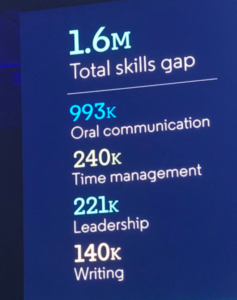I read an article recently where a “former” Google HR executive shared his wisdom. (editor side note – are all Google HR executives “Former”? Have you ever heard from a “current” Google HR executive? Why does Google have a hard time keeping HR execs?)
The dude’s name is Justin Angsuwat and he’s the current VP of People at Thumbtack, which not ironically does not make thumbtacks but it would awesome if they did. And he give his inside Google advice to Business Insider on how to get promoted. Are you ready?
Why is this promotion important to you?
Justin Angsuwat
Um, what?!
Seriously, that’s your advice Justin?
Okay, I’m sure Justin is brilliant, he’s Australian and worked for PwC and Google, and let’s face it, American’s will hire any idiot with an Australian accent, but I’m sure Justin is not an idiot, but I hate the “I’m going to answer your question with a question” because that’s how ‘real’ leaders do it.
What Justin is saying is most people have no idea why someone wants to be promoted. We just get this idea in our head that’s what we are supposed to do, so as leaders we need to figure out why, because most don’t really care if they get promoted, they just want you to pay attention to them!
Okay, Justin, I’ll agree with that. Now tell me why there are so many former Google HR executives!?
What do you really need to do if you want to get promoted?
- Tell you current boss you want to get promoted and why.
- Tell the boss that you’ll be under when you get promoted that you want to get promoted and why. This is a must-do if your current boss is a tool and won’t raise you up to the organization.
- Get a specific development plan around what the organization needs to see from you to get promoted. If you can, try to get some realistic timing around the plan. Understand, 90 days, is not realistic. 3 years, might be. I find most people who want to get promoted believe they have already put in the work, but those above them don’t see it that way.
- Do the work and be patient.
- Be a positive advocate for your boss and for the company. Yes, you might even cheerlead a little. Don’t ever underestimate the power of positivity on your ability to get promoted. Executives hate promoting assholes. Right, Justin?
I teasing Justin, but I actually really like his question. Way too many people chase titles, but don’t really know why they’re chasing it. They get there and it feels unsatisfying because the reality is it’s not what they expect it to be.
Getting promoted because you want more money, probably isn’t the reason you really want. It’s legitimate, but you won’t be happy. Wanting to lead teams or functions is better, wanting to help others reach their goals is even better, wanting to help the company reach its mission and you’re all in on the company is probably the best.
Most of us don’t even think about those things, though.

